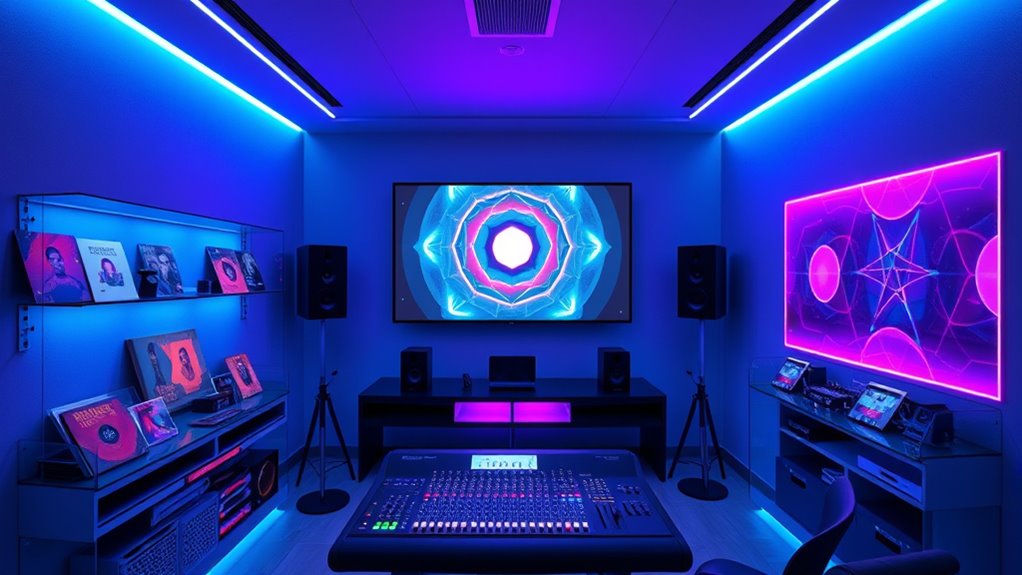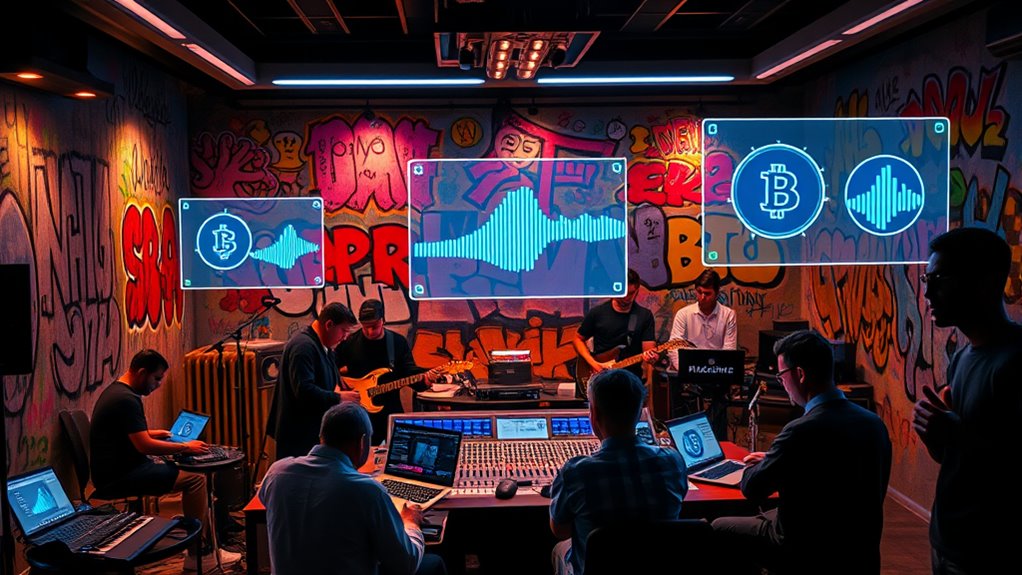The rise of decentralized music labels is giving you more control over your music and revenue. Thanks to blockchain and NFTs, artists like you can bypass traditional gatekeepers, creating transparent and fair systems. You can manage ownership, set your own terms, and connect directly with fans. This shift encourages innovation, from unique releases to community-driven models. Keep exploring to discover how this evolution empowers artists and transforms the music landscape even further.
Key Takeaways
- Blockchain enables decentralized music labels that empower artists with control over ownership, distribution, and revenue streams.
- NFTs allow artists to monetize digital assets through unique releases, increasing transparency and community engagement.
- Smart contracts automate royalty payments, reducing disputes and ensuring fair profit sharing for artists and fans.
- Decentralized labels eliminate traditional gatekeepers, fostering direct artist-fan relationships and innovative revenue models.
- Knowledge of digital ownership is essential for participating effectively in the evolving landscape of blockchain-based music platforms.

Have you ever wondered how the music industry is changing with blockchain technology? One of the most exciting developments is the rise of decentralized music labels, which are reshaping how artists connect with fans and control their careers. Unlike traditional labels, these new platforms leverage blockchain to create transparent, equitable systems that prioritize artist empowerment. With blockchain, artists aren’t just signing contracts—they’re actively participating in the ownership and distribution of their work. This shift enables more direct relationships with fans and opens doors for innovative collaborations, such as NFT collaborations, which can generate new revenue streams and foster closer community engagement.
NFT collaborations are transforming how artists monetize their work. When you think about NFTs—non-fungible tokens—you realize they offer a way to prove ownership and authenticity of digital assets. Artists can release unique or limited-edition music, artwork, or concert experiences as NFTs, giving fans a chance to own a piece of music history. Decentralized music labels facilitate these collaborations by providing a platform where artists can easily mint and sell NFTs without the need for traditional intermediaries. This process not only increases transparency but also ensures artists receive a fairer share of profits. As a result, fans become active participants, buying, trading, and showcasing their collections, which helps build stronger communities around artists and their music.
Artist empowerment is at the core of this revolution. With decentralized labels, you get more control over your creative output and how it’s distributed. Blockchain technology removes the gatekeepers that historically dictated what you could produce or how you earned from your work. You can release music directly to your audience, set your own pricing, and even decide how royalties are split. Smart contracts automatically distribute earnings whenever your music is sold or streamed, reducing delays and disputes. This model encourages innovation because artists are no longer bound by the constraints of traditional contracts and can experiment with different revenue streams—like exclusive NFT drops or fan club memberships—without losing control over their intellectual property. Additionally, understanding digital ownership is crucial for navigating this new landscape effectively.
Frequently Asked Questions
How Do Decentralized Labels Profit Compared to Traditional Labels?
Decentralized labels profit differently from traditional ones through direct royalty distribution and profit sharing. You, as an artist, often keep a larger portion of your earnings because these labels eliminate middlemen. They use blockchain technology to guarantee transparent royalty distribution, so you receive fair payments quickly. Unlike traditional labels that take hefty cuts, decentralized labels empower you with better profit sharing, making your music career more financially rewarding.
What Legal Challenges Do Decentralized Music Labels Face?
You might think decentralized music labels sail smoothly, but they face ironic hurdles like protecting intellectual property and meeting regulatory compliance. Without a central authority, you struggle to enforce copyrights, risking piracy and theft. Steering through complex legal landscapes becomes a maze, with no clear authority to turn to. So, while decentralization promises freedom, it ironically complicates legal challenges, making compliance a daunting obstacle in your innovative journey.
How Do Artists Select a Decentralized Label?
When selecting a decentralized label, you value artist autonomy and community voting. You look for platforms that empower you to make decisions and participate in the label’s governance. You compare how each label involves its community in choosing projects or artists, ensuring your voice matters. By prioritizing transparency and collective participation, you find a decentralized label that aligns with your desire for independence and shared control over your music career.
What Platforms Support Decentralized Music Label Operations?
Ever wondered which platforms support decentralized music label operations? You’ll find that blockchain-based platforms like Audius and Choon enable artists to manage their music through blockchain governance, ensuring transparency. These platforms also streamline artist royalties, making sure you get paid fairly and promptly. By leveraging such platforms, artists actively participate in decision-making and retain control over their music, redefining how music labels operate today.
Can Decentralized Labels Help Emerging Artists Gain Exposure?
Decentralized labels can considerably boost your exposure by leveraging crowdfunding campaigns and community engagement. You’ll find more opportunities to connect directly with fans, gain support, and share your music widely. These labels empower you to build a loyal audience and gain visibility without traditional gatekeepers. By actively participating in community-driven efforts, you increase your chances of standing out and growing your career in a more autonomous, authentic environment.
Conclusion
As you explore decentralized music labels, you realize they put power back in your hands, breaking traditional barriers of the record industry. With blockchain tech and smart contracts, you can directly support your favorite artists and even become part of their journey. It’s like stepping into a modern-day jazz club, where everyone’s voice matters. Embrace this revolution, and you’ll see how the future of music is shaping up—no DeLorean needed, just innovation.









